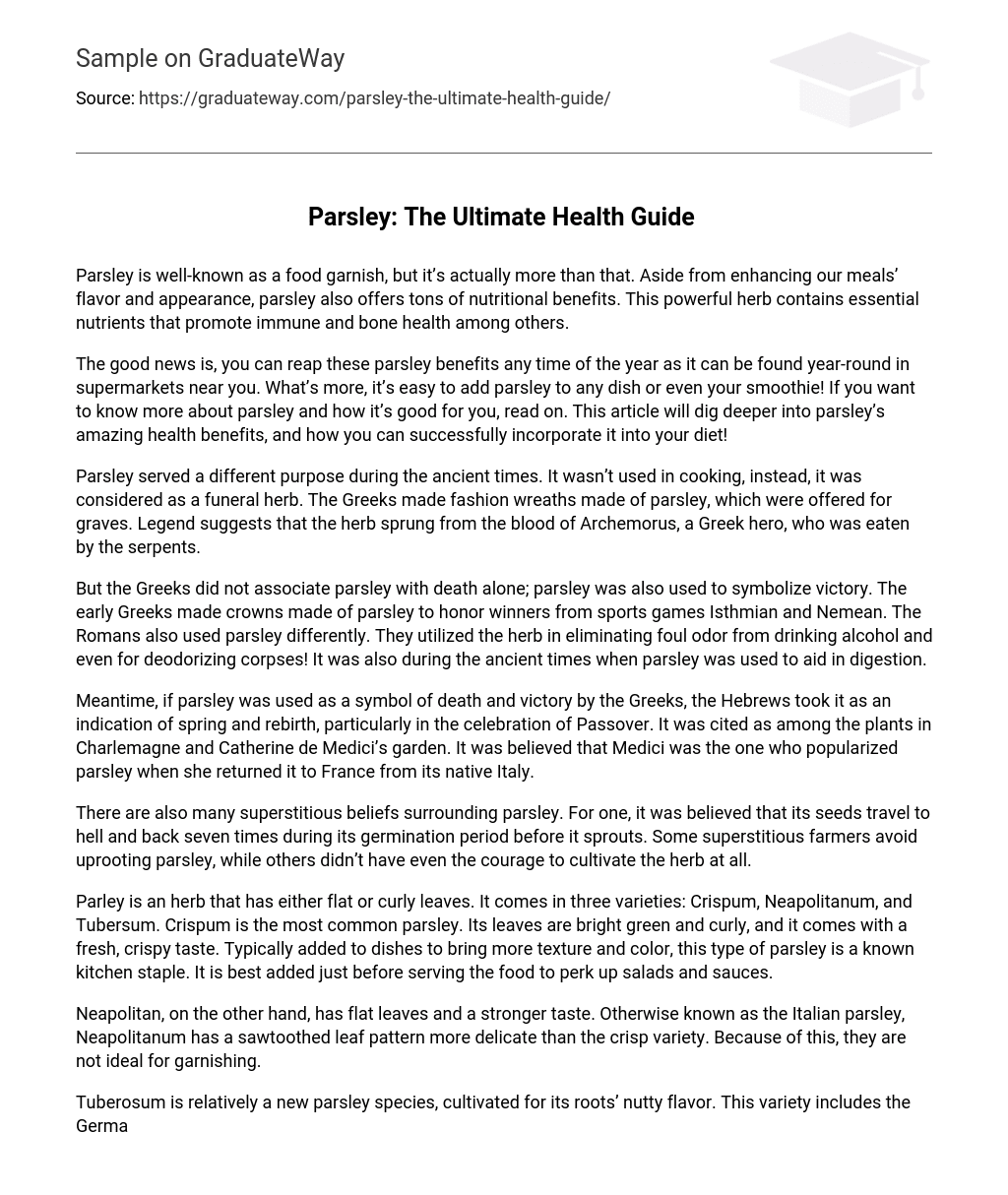Parsley is well-known as a food garnish, but it’s actually more than that. Aside from enhancing our meals’ flavor and appearance, parsley also offers tons of nutritional benefits. This powerful herb contains essential nutrients that promote immune and bone health among others.
The good news is, you can reap these parsley benefits any time of the year as it can be found year-round in supermarkets near you. What’s more, it’s easy to add parsley to any dish or even your smoothie! If you want to know more about parsley and how it’s good for you, read on. This article will dig deeper into parsley’s amazing health benefits, and how you can successfully incorporate it into your diet!
Parsley served a different purpose during the ancient times. It wasn’t used in cooking, instead, it was considered as a funeral herb. The Greeks made fashion wreaths made of parsley, which were offered for graves. Legend suggests that the herb sprung from the blood of Archemorus, a Greek hero, who was eaten by the serpents.
But the Greeks did not associate parsley with death alone; parsley was also used to symbolize victory. The early Greeks made crowns made of parsley to honor winners from sports games Isthmian and Nemean. The Romans also used parsley differently. They utilized the herb in eliminating foul odor from drinking alcohol and even for deodorizing corpses! It was also during the ancient times when parsley was used to aid in digestion.
Meantime, if parsley was used as a symbol of death and victory by the Greeks, the Hebrews took it as an indication of spring and rebirth, particularly in the celebration of Passover. It was cited as among the plants in Charlemagne and Catherine de Medici’s garden. It was believed that Medici was the one who popularized parsley when she returned it to France from its native Italy.
There are also many superstitious beliefs surrounding parsley. For one, it was believed that its seeds travel to hell and back seven times during its germination period before it sprouts. Some superstitious farmers avoid uprooting parsley, while others didn’t have even the courage to cultivate the herb at all.
Parley is an herb that has either flat or curly leaves. It comes in three varieties: Crispum, Neapolitanum, and Tubersum. Crispum is the most common parsley. Its leaves are bright green and curly, and it comes with a fresh, crispy taste. Typically added to dishes to bring more texture and color, this type of parsley is a known kitchen staple. It is best added just before serving the food to perk up salads and sauces.
Neapolitan, on the other hand, has flat leaves and a stronger taste. Otherwise known as the Italian parsley, Neapolitanum has a sawtoothed leaf pattern more delicate than the crisp variety. Because of this, they are not ideal for garnishing.
Tuberosum is relatively a new parsley species, cultivated for its roots’ nutty flavor. This variety includes the German and Hamburg parsley, which are slowly gaining popularity. Since its leaves have a bit too strong flavor, its roots take the spotlight. Its delicious taste is perfect for purees, stews, salads, and soups.
It is important to note, though, that these three varieties are very different from Aethusa cynapium, more commonly known as Fool’s Parsley. This plant can easily be mistaken for parsley, but it is not safe for human consumption. Fool’s parsley has poisonous alkaloids, which can cause severe poisoning when taken at small amounts. Consumption of significant amounts of Fool’s parsley may even lead to death.
Even during the ancient times, parsley has been used to get rid of alcohol smell from the mouth. Today, it is still used as a household remedy for bad breath. Studies have not been founded yet regarding parsley’s effectivity on eliminating bad breath. However, other studies suggest that parsley can be an effective tool in removing foul sulfur compounds. It is also believed that the chlorophyll levels in parsley may play a part in this regard due to its anti-bacterial properties.
Parsley contains diuretic properties, which help treat high blood pressure. The herb was also used to accelerate the removal of toxic elements from the digestive system, and to cure fluid retention or edema. It is essential to keep in mind, though, that high blood pressure may lead to other serious health conditions. It is best to consult with your physician first if you’re planning to use parsley for medicinal purposes.
Parsley has also been used to reduce colic pain and flatulence. Parsley oil was also said to be helpful in regulating menstrual flow, and in treating dysmenorrhea and amenorrhea. Parsley leaves were also used in the treatment of insect bites, skin parasites, contusions, and even tumors.
It was also traditionally used to cure various diseases of the spleen, liver, and prostate. History also showed that the herb was likewise used in treating arthritis, anemia, and even certain cancers. Parsley was also utilized as a scalp lotion to promote hair growth. But, while there’s a generous range of parsley uses for medical treatment, no clinical trials have been made yet to confirm these.
Parsley was also said to be beneficial in treating allergies. A 1984 study published in the Journal of Allergy and Clinical Immunology revealed that the herb prevents the secretion of histamine, which triggers the symptoms of allergy. Parsley is also considered as a helpful herbal remedy for hay fever.
Studies conducted on lab animals also revealed that parsley can reduce blood sugar, suggesting that the herb can be used as a natural remedy for diabetes. Today, parsley is widely used to garnish and add texture and flavor to our meals. The herb also plays a major role in certain cuisines such as the Lebanese, particularly in its national dish, tabbouleh.





